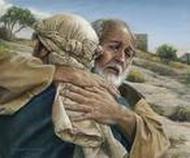Cultural Insights
in the Prodigal Son ~ Luke 15.25-32

Decades of life and ministry in the Middle East and a lifelong fascination with the
parable of the Prodigal Son have combined to give Kenneth Bailey a unique perspective
on the parable. We find his insights in several excellent books:
Kenneth E. Bailey, The Cross & the Prodigal, IVP, 1973, 2005.
_______________, Finding the Lost, 1992.
_______________, Jacob and the Prodigal, 2003.
Two of Bailey's basic convictions are found in the following statements:
1) “The culture of the speaker must be penetrated if what is said is to be understood. Even so with the life and
teachings of Jesus.” (The Cross & the Prodigal, 11)
2) "Middle Eastern culture was a better lens through which to examine the parables of Jesus than my inherited
contemporary American culture.” (The Cross & the Prodigal, 11)
Reading Assignment ~ Read The Cross & the Prodigal, pages 26-89.
Luke 15.25-32
1) Read Luke 15.25-32, the climactic interaction between the father and the elder son, carefully.
2) Look over the following questions:
1) What would the elder son have been doing out in the field?
2) What would the elder son have been expected to do when the father arranged a feast?
3) Who explains the "music and dancing" to the elder son?
4) What is the cultural significance of mentioning the younger son's "good health"?
5) How does the father open himself to public shame in his interaction with the elder son?
6) In what ways does the reaction of the elder son shame his father?
7) How do the father's actions defy cultural expectations?
3) Consider insights you have gained from your reading assignment that speak to these questions and help us
understand the cultural setting of this scene in the parable of the Prodigal Son.
4) Double-check your memory by reading through the answers/insights found at this link.
STEPPING OUT ~ Compose a 100-200 word devotional based on one insight you have gained into the cultural
context of this section of the parable of the Prodigal Son.
parable of the Prodigal Son have combined to give Kenneth Bailey a unique perspective
on the parable. We find his insights in several excellent books:
Kenneth E. Bailey, The Cross & the Prodigal, IVP, 1973, 2005.
_______________, Finding the Lost, 1992.
_______________, Jacob and the Prodigal, 2003.
Two of Bailey's basic convictions are found in the following statements:
1) “The culture of the speaker must be penetrated if what is said is to be understood. Even so with the life and
teachings of Jesus.” (The Cross & the Prodigal, 11)
2) "Middle Eastern culture was a better lens through which to examine the parables of Jesus than my inherited
contemporary American culture.” (The Cross & the Prodigal, 11)
Reading Assignment ~ Read The Cross & the Prodigal, pages 26-89.
Luke 15.25-32
1) Read Luke 15.25-32, the climactic interaction between the father and the elder son, carefully.
2) Look over the following questions:
1) What would the elder son have been doing out in the field?
2) What would the elder son have been expected to do when the father arranged a feast?
3) Who explains the "music and dancing" to the elder son?
4) What is the cultural significance of mentioning the younger son's "good health"?
5) How does the father open himself to public shame in his interaction with the elder son?
6) In what ways does the reaction of the elder son shame his father?
7) How do the father's actions defy cultural expectations?
3) Consider insights you have gained from your reading assignment that speak to these questions and help us
understand the cultural setting of this scene in the parable of the Prodigal Son.
4) Double-check your memory by reading through the answers/insights found at this link.
STEPPING OUT ~ Compose a 100-200 word devotional based on one insight you have gained into the cultural
context of this section of the parable of the Prodigal Son.
